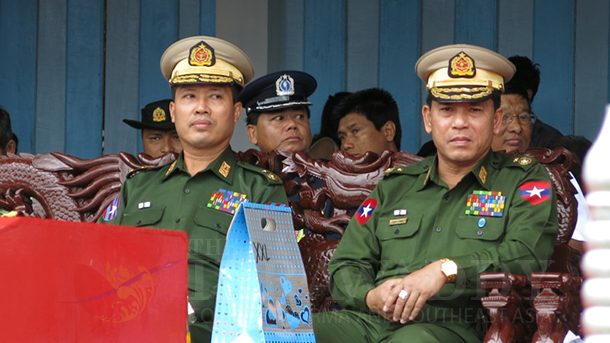RANGOON —Gen. Maung Maung Ohn, the newly appointed chief minister of Arakan State, vowed during his first speech to the state’s legislature since assuming his new role that he would come down hard on anyone caught smuggling Rohingya Muslims into or out of the state.
The pledge, made on Wednesday, came after reports that two people had been arrested in the state’s Ann Township after police there discovered eight Rohingyas hidden inside their vehicle. The two suspected smugglers, who were identified as children of a former police chief, were traveling to Rangoon at the time.
Under Burma’s 1982 Citizenship Act, the Rohingya are not recognized as one of the country’s 135 ethnic groups, rendering them effectively stateless. Among other restrictions placed on them, they are not allowed to leave Arakan State for other parts of the country.
Speaking in the state capital Sittwe on Wednesday, Maung Maung Ohn called the accused smugglers “traitors of their national race” and vowed to punish them to the full extent of the law.
Thet Tun Aung, a state legislator from the Arakan National Party, said the general promised to do his utmost to address the “Rakhine issue”—referring to the concerns of ethnic Arakanese Buddhists who say the Rohingya are illegal immigrants from neighboring Bangladesh—because it is an issue that affects the whole country.
“He [Maung Maung Ohn] said he would have zero tolerance of anyone who violated the country’s citizenship laws,” said Thet Tun Aung.
Wearing civilian dress despite being an active member of Burma’s armed forces, Maung Maung Ohn greeted state lawmakers during his first day in the state assembly, where he was unanimously confirmed as the new state chief minister on Monday after being nominated for the position by the President’s Office late last month.
The appointment initially met with resistance from Arakanese nationalists who opposed the idea of having an ethnic Burman lead the state, but the general has moved quickly to reach out to the state’s Arakanese majority.
According to local sources, he will soon visit Mrauk-U and Kyauktaw townships in the state’s north, where he will meet with farmers who say that their land was taken away from them by the Burmese military.
“A lot of local people are hoping that he will be able to help them get their land back,” said Thet Tun Aung.

















